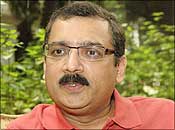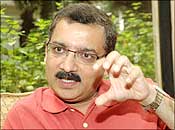Sashi Chimala is no ordinary entrepreneur. He is not only the 'Jack of all trades,' but -- strangely enough -- even master of all. Even as a young boy Chimala dreamt of becoming an entrepreneur. And become he did. Chimala founded not one, not two, but many companies, and they are in diverse fields like software to coffee to cricket to gaming.
He is one of the founding members of Covansys; founder of Indigo Technologies (which was later acquired in a 2-way deal between SSI and Nasdaq); of Qwiky's Coffee, a pioneering retail venture in Asia; and of CricTV.com, the first social video network for cricket. His recent entrepreneurial venture is Interactive Media Technology Inc, which is to launch knibble.com, an online gaming company on July 11.
In this interview with Contributing Editor Shobha Warrier, he travels through his ventures, needless to say all quite successful.
Early dreams
It may sound very corny, but my inspiration was Mahatma Gandhi. I always dreamt of becoming an entrepreneur. This may have grown from my obsession with being independent. Both financial independence and independence of thought mean a lot to me.
As creativity is the core component of entrepreneurship, I want to tell you about my cartooning days. I started drawing cartoon, which appeared in almost all Telugu publications, as a schoolboy in Andhra Pradesh. The money I earned went towards my education. By now, I must have drawn around 5,000 cartoons.
After completing engineering at Kakinada in Andrhra Pradesh, I went to Bombay (now Mumbai) for my post graduation.
Moving to the US in 1979
Then in 1979, I went to the United States. I was a programmer at the Tatas. The story of Indian IT outsourcing actually started around that time. TCS and Tata Burroughs were the only two companies engaged in it, and I was in the second batch and the 60th person to go to the US, to be precise.
Those days were difficult because the Americans wouldn't understand our accent. We were treated as 'aliens'! The word alien was an official term to describe an immigrant. Your green card says 'permanent alien' even when we are all human beings and not residents of outer space!
Anyway, we were aliens; we were immigrants, but it was the beginning of Indians making it big in the US.
The US of the seventies and the US of today
America being a country of immigrants, as a rule, is more tolerant of outsiders. But there is a huge difference between the US of 1979 and the US of today. If we were aliens then, today we belong to the most sought after and richest segment. Indians and the Chinese are excelling in mathematics, spelling, and academics.
As an entrepreneur, I saw better chances in the US than in India in those days. If you have a good idea, nothing limits you as an entrepreneur in the US. You don't have to come from a rich family to create a big company; you only need to have a great idea.
 Co- founding Covansys
Co- founding Covansys
In 1987 I helped Raj Vattikutti to start a company called Complete Business Solutions (later renamed as Covansys). Later, I joined the company and expanded it in the west coast of the US, while Raj was in the east coast. That was how I learnt the ropes of being an entrepreneur.
On the one hand, it was easy since we were among the very few Indian companies, and, on the other, it was difficult because we were trying to prove to the world that Indians were good entrepreneurs.
In a couple of years the message was out that ours was a good company. Immigrants, not just Indians, but all, work hard because they are out there to prove themselves and not enjoy life.
Founding Indigo Technologies
I always wanted to start a company that was into products as almost everyone else was focussing on services. In 1992, I founded Indigo Technologies in Cupertino, California. We built an audacious product to automate stock exchanges. I must say it was quite fulfilling.
Tandem Computers, the de facto providers of stock exchanges and banks liked our product, and they helped us sell it in Taiwan. Nasdaq was already their customer and they introduced us to them. The chief technical officer of Nasdaq went on record saying our product was ten times more saleable than what they had at that time.
Nasdaq Europe and Nasdaq Japan exchanges went for our product. We eventually sold our company when Nasdaq, in a joint venture with SSI, formed a company called IndigoMarkets, which used our software.
 Back in India
Back in India
After living in the US for 20 years, I came back to India because of Indigo Technologies. Tandem became Compaq Computers and took equity in our company, so we had to consolidate all our operations and business. Since we had quite a big team in India, it was suggested that I run the company from here as its chief executive officer.
The new India
And it was quite a homecoming. I came back to a hugely different India -- a new India -- in 1998. In the seventies, I would not have dreamt of launching a company in India. The new India has tasted the fruits of enterprise. It will never go back to the old ways. Launching a new company may take longer in India, compared to the US, but it's still an achievement.
Starting Qwiky's, coffee chain shop
After SSI Technologies bought Indigo, I started Qwiky's Coffee Pub. My wife and I missed a genuine coffee joint. In San Jose, we would often go to Starbucks and have a nice cup of coffee. That concept was non-existent in India.
Retail outlets, at that time, were new to India. Still, against a projected 100,000 cups of espresso in 12 months, Qwiky's sold 365,000 cups! In the first two years, Qwiky's had sold over one million cups of coffee. When I started Qwiky's I had no competition. The very concept was absent. It was frustrating and exhilarating too. I am glad that I could kickstart an industry.
Qwiky's has been remodelled into a franchisee format and will resurface soon in a new avatar.
Indian coffee house in the US and the UK
With Qwiky's I brought the western concept of coffee pub to India. Now I want to take the Indian concept of the coffee house to the US and UK. Coffee houses in India are places where writers, painters, artists and even businessmen met and had serious intellectual discussions.
This is the perfect time to take this concept to the West. Today India is no more an alien nation.
Launching interactive community networks
Since Qwiky's was on well-oiled rails, I decided to focus on the technology sector. The second wave of web technology is approaching and it is going to be very exciting.
That was how the Interactive Ad network and cricket social network (CricTV.com ) came into being. Social networks are going to be the next major thing and it caters to the youth market. As cricket is still an untapped market, we decided to start a social video network for cricket fans that serves as a video sharing platform (similar to YouTube) where anyone can post their personal cricket videos, video blogs and personal opinions. CricTV.com is a community network that is intended to motivate people to watch, share opinions, special moments and videos on cricket.
Online gaming
Soon, we are going to launch knibble.com, an online gaming site. I call it the Google of games. Knibble is for gamers of all ages and it's for free.
Internet, the new medium and the market
We also plan to create many more small niche verticals. Indian Internet advertising market is around 1.5 per cent of the total advertising market while in the US, the same is around 6 or 7 per cent, which is close to $100 billion. The future of the communication sector lies in Internet. Entrepreneurs should grab a pie of this segment and create new values and rules. I am very excited about the possibilities.
Photograph: Sreeram Selvaraj






 © 2025
© 2025